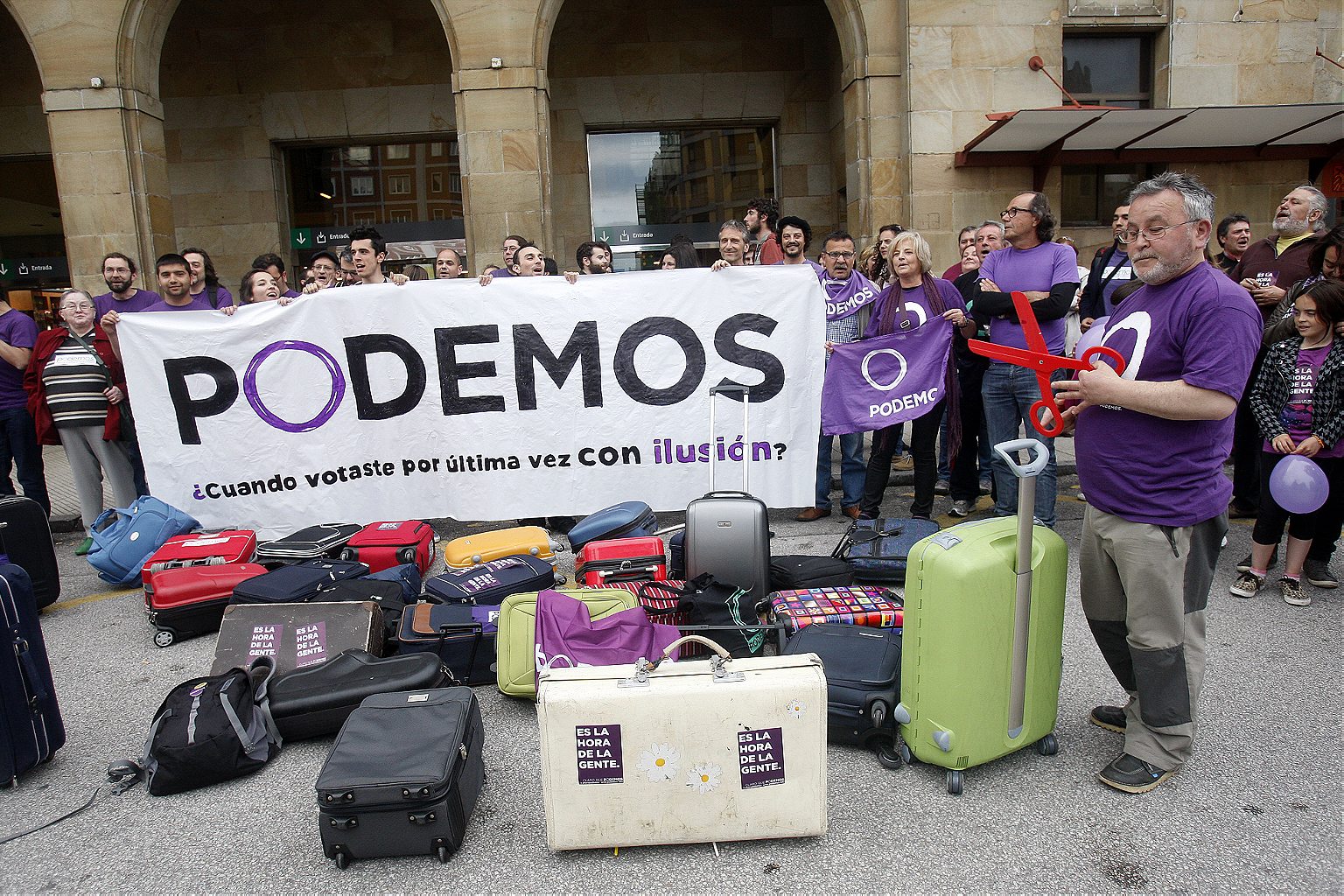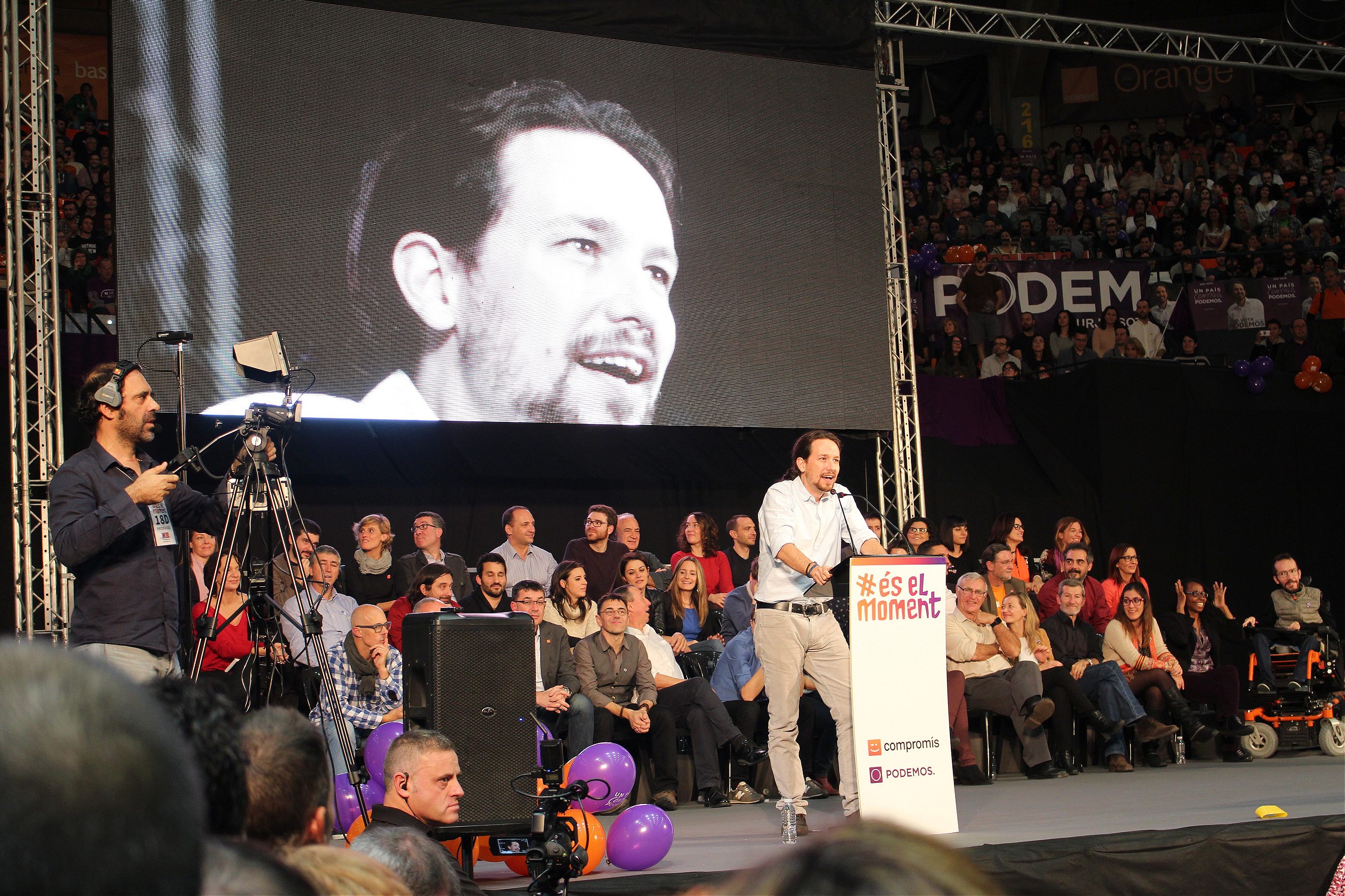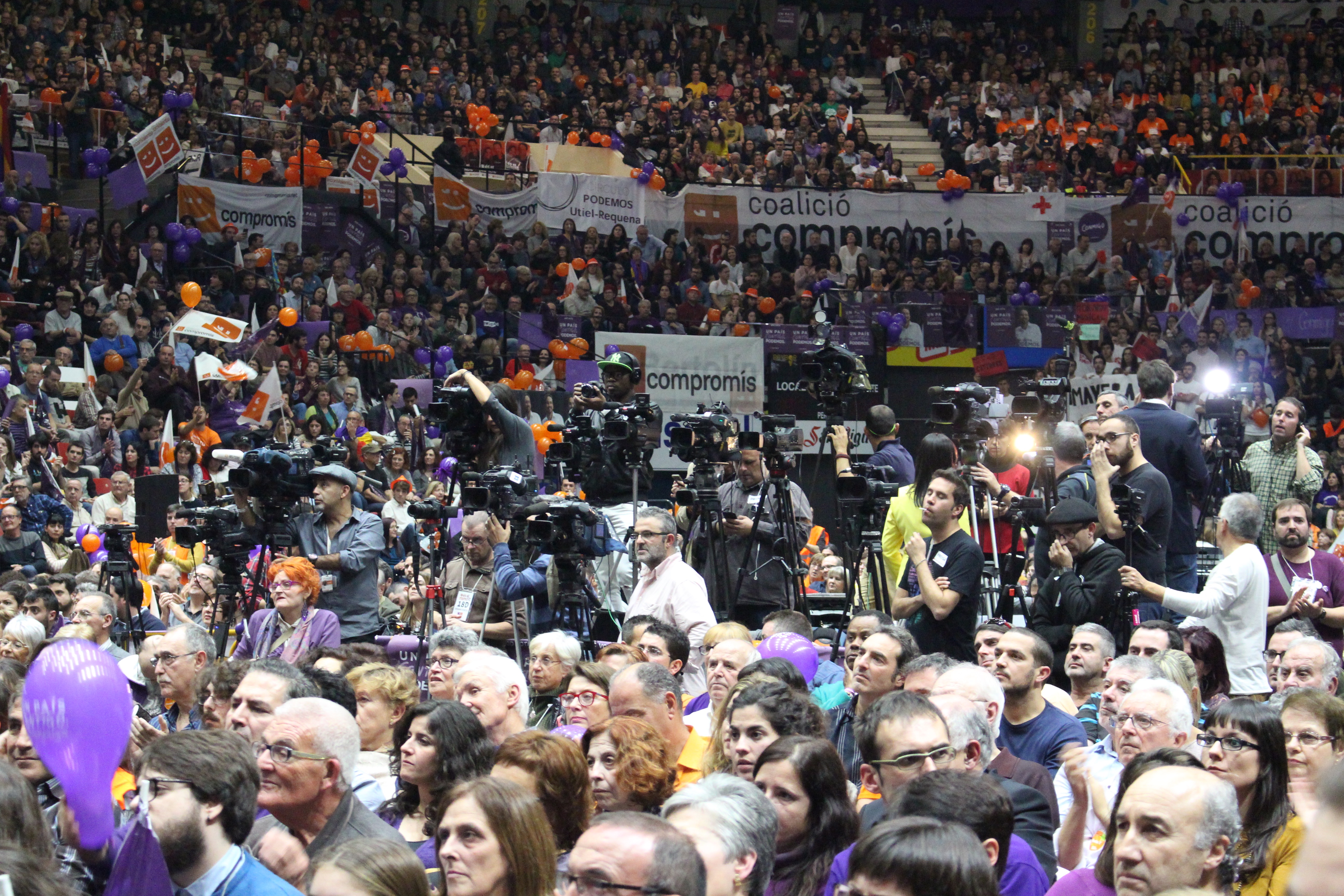Hitting the campaign trail with the long-haired, jeans-wearing, anti-austerity power brokers.
The prime minister has been punched in the face. While at a campaign event in the northwestern city of Pontevedra, a teenage boy slammed his fist into Spanish Prime Minister Mariano Rajoy, breaking his glasses. Within the opposition political party Podemos, fear immediately erupts that the boy is one of their supporters. However, in time the story gains clarity: it was a relative, not a Podemos supporter, who punched the prime minster. The teen, it is revealed, is Rajoy’s wife’s cousin’s son; Podemos proponents heave a sigh of relief. Suddenly, the election begins to feel more like a Pedro Almodovar film than a decade-defining campaign.
My week following Podemos, the left-wing party whose name translates as “We Can,” begins in the Galician city of La Coruña. It is raining when I arrive and within minutes of dropping my bag at the hotel, I am lost. The city sits on the side of a jagged coastline with a large dock. When I hear the Atlantic wind knocking anchored fishing boats together, I follow the ringing until I get my bearings and attend the first of seven Podemos events this week.
Unemployment in Spain is 17 percent and the average salary has fallen to its lowest level since 2007; in the midst of these declining fortunes, 40 percent of voters in the upcoming national election say they are undecided. Since Spain’s fascist dictator Francisco Franco died in 1975, the country has been ruled by two parties: the right-wing Popular Party (PP) and the center-left Spanish Socialist Workers Party (PSOE). Following a punishing financial crisis nearly eight years ago, the PP were elected in 2011 and swiftly privatized education and health services, all the while being embroiled in corruption scandals. Last year, nearly a hundred families were being evicted from their homes every day. The country’s main political opposition, PSOE, have proposed economic solutions to this crisis, but with a similarly poor corruption record and a commitment to the same neo-liberal economic philosophy that helped create the original crisis, neither party looks set for a majority.
Podemos candidates by and large have no professional political experience
This is what Podemos is counting on: that voters are now ready for a change. At the rally, capacity is full; some find space in the theater’s aisle and on the edge of the stage, where they sit crossed-leg. Students, nurses, lawyers, teachers, office workers: tonight’s attendees are from every economic sector. There’s no agreed upon dress code. Some come wearing tatty walking boots and North Face raincoats, others in thick cotton jumpers with oxford shirts underneath. There are several long scraggy beards on show; as are a few nose and lip piercings. Everyone sits quietly and listens. This political movement has its roots in the Indignados movement of 2011. Politically non-aligned and furious at the post-financial crisis settlement, the Indignados organized themselves with open and collaborative sessions to resist public sector cuts with direct action, much like the Occupy movement in the U.S. However, in Spain, the movement has translated its popular appeal into real political gains.
The political successors to the Indignados, Podemos candidates by and large have no professional political experience. They are calling for a wide range of socially progressive reforms: empowering the judiciary in their fight against corruption, reforming domestic violence laws and promoting anti-sexism campaigns, increasing the number of green jobs, ending economic austerity programs, and allowing the region of Catalonia to hold a referendum on seceding from Spain. Perhaps most importantly, early results show that half of all Podemos’s elected candidates are women; Podemos supporters will also elect Spain’s first black politician, Rita Bosaho.
Back in the hotel, I change into dry clothes and switch on the TV. An eight-way debate is taking place. The baby faced Iñigo Errejón, a Podemos congressional candidate from Madrid, is explaining how an economic recovery built on low wages, high unemployment, expensive bills, and cuts to hospitals and schools is destroying millions of lives. It’s midnight and there is no sign of the debate ending; I turn off the TV and fall asleep.
The following day, the local Podemos team show me around La Coruña’s city hall. As we walk down red-carpeted halls ways, they explain the history of each ex-mayor featured in the enormous portraits that hang on the walls. We pause in front of a particularly large man. “He weighed so much that when he died, he was pushed out the window,” I’m told. La Coruña’s current mayor, Xulio Ferreiro, comes to work in jeans, sweaters, and sneakers. An ex-professor, he’s one of many activists who now hold office. Elected in May of this year, he ran on an anti-privatization and anti-corruption ticket.

The next day I’m in the northern city of Oviedo. Its medieval squares are busy with groups of friends drinking small glasses of cider made from the rich supply of apples that grow outside the city. A small, orange car with megaphones attached to its roof advertises a rally for the center-right party Ciudadanos—Citizens—another group challenging Spain’s two-party system. While Podemos shifted the focus of this election toward political change, Ciudadanos, which was created in Barcelona in 2008, have stolen some of this ground. With a young, intelligent, and media savvy leader, who once posed naked for a campaign photo, their manifesto includes preventing undocumented migrants from accessing healthcare and scrapping progressive gender laws.
Tonight’s Podemos rally is held in a sports hall: 4,000 supporters sit on plastic garden chairs. The chants begin and a two-man band play, creating a carnival-like atmosphere; there’s a mixture of indignation and hope in the air. Groups of children spread out on large pieces of paper stuck to the floor, drawing pictures with crayons. Other children chase balloons in the campaign’s signature color of purple. A middle-aged couple are linking arms and quietly talking. I move up the stairway and take the free seat next them. “Will you vote for Podemos?” I ask. “Of course,” the woman replies. “They’re young and fresh. We don’t want any more of those old, political elephants taking the place of the people in Madrid, waving their trunk around.” As the rally begins, word spreads that the Ciudadanos event is only part full in a venue that holds just 1,000 people.
Podemos’ leader, the 36-year-old, pony-tailed Pablo Iglesias, was supposed to be speaking, but following the death of two Spanish police officers in a terrorist attack in Kabul, he’s returned to Madrid to attend the funeral with the other candidates. Iglesias has come under criticism for his aggressive debating style, a characteristic he says is symbolic of the ‘old left,’ and which didn’t endear him to many in the party’s early days. Tonight’s video recording of him is played on three large screens. Igelsias’ tone today seems much calmer.
The video shows him with a collection of bracelets on his wrist, an unkempt beard, and crooked teeth. When he participated in the national debate last week, he stuck with his jeans and shirts, while the other candidates wore suits. With a blue pen in his hand, he looks more like a professor than a politician, which is probably because that’s just what he was before being elected to the European Parliament in 2014. Previously, he lectured in political science at Madrid’s left-leaning Complutense University, the next stop on my journey.

I fly to Madrid from Oviedo and land in a much colder climate. While political activism has erupted across all Spain, the capital in particular has been a hotbed of political action and many Podemos leaders hail from the city. At the university, there are posters on the walls outside welcoming refugees in Spanish, English, and Arabic, and anarchist graffiti covers the faculty walls. In addition to Iglesias’s history with the school, Iñigo Errejón—the fresh-faced candidate from the televised debate—was awarded his PhD here.
There are no tables free in the café, so I sit by the bar. The coffee is a dark, powerful sludge and at 75 cents each, I buy two cups. Students are chatting, enjoying their last days before they end for Christmas. These young adults have a difficult journey once they graduate. This generation will have lower living standards and employment prospects than the last. Youth unemployment reached a record high of 55 percent in 2013 in Spain and just entering the job market will be difficult for those in this room; they are some of Podemos’ most ardent supporters.
A woman from Seville next to me is passing around her phone and smiling. I ask what’s caught her attention. From today on, the Spanish media are banned from reporting polling data; however, the parties continue with their private polling and it finds its way on Twitter. Podemos in particular has used social media prowess to bolster their rapid rise in popularity. Social media employs emojis to represent each party’s progress in order to sidestep the enforced media blackout. According to the latest leaked polls, the purple eggplant (Podemos) is up 1.5 percent on the orange (Ciudadanos), just below the blue raindrop (PP) and red strawberry (PSOE).
I leave Madrid and meet Iglesias’ campaign bus in Murcia. The bus cruises along the straight roads of southern Spain. Dry olive-groves, clear blue skies, and stark dusty land slide by outside the window. After Iglesias has taken questions from a journalist, the bus falls silent: no radio or music, only the steady hum of the bus’s engine. The sun beings to set as we reach Valencia’s outskirts and hit traffic.
Last week Podemos lay in fourth place; now the party is polling second in several surveys. When election results come in on Sunday, the party’s success will be confirmed: while the conservative PP will get the most votes, it will lose its majority, while Podemos will trump Ciudadanos, coming in just behind the PSOE and setting the stage for a possible left-leaning coalition. “Today sees the start of a new political era. The forces of change are making an historic advance,” Iglesias will tell supports in central Madrid after the election.

The effort it took to make these gains shows. Iglesias’ staffers, dressed in t-shirts, old sweaters, and jeans, are exhausted: dark bags sit like bruises under their eyes. While most of the rallies have been boisterous, the mood on the bus, full of Iglesias’ closest advisors, hovers between exhaustion and satisfaction. We arrive at the venue and people start chasing the bus. Iglesias picks up his lecturer’s backpack and walks into the stadium.
Within half an hour Iglesias will be on the stage for the last time, but there’s just one final problem: the stadium is already full and there are more than 1,000 people waiting outside.
Candidates for Spain’s Senate and Congress stand, hands on hips, huddled in a circle by the door, trying to decide what to do. The circle gets smaller as the sounds of the crowd one floor above increases: 13,000 chanting supporters. Someone begins calling out the names of candidates, summoning them upstairs. One of those names is Ada Colau, Barcelona’s first female mayor, who was once arrested for her participation in occupying a bank. She now runs Spain’s second biggest city. Just a few years ago this group were anonymous citizens; now they are among Spain’s political elite.
After a lifetime of activism and screaming from the sidelines, these people are on the cusp on power. Iglesias and his cohorts have been criticized for their lack of experience from the right and for their willingness to centralize the party’s power in the left, but they have managed to draw ever larger crowds to their side. Now, they are getting nervous. Hands are rubbing necks. People are spontaneously hugging each other. The candidates agree to go outside to address the crowd before heading to the stage inside. There is a final call for everyone’s attention. The door opens, and they are gone.